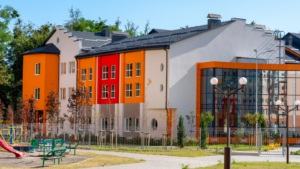Friends and Neighbors,
The 2024 legislative session wraps up today. The 2025 session doesn’t begin until next January. In the meantime, we move into the period called “interim,” when legislators return to their districts and their regular lives… while continuing to respond to questions and concerns from their constituents.
This interim also includes an election. Legislators who are up for reelection, or who are candidates for another public office, are subject to election-year restrictions that prohibit state resources from being used for most official communication purposes. The idea is to prevent incumbents from having an unfair advantage over challengers, and I support that.
Because I am up for reelection this year, you will not receive any legislative e-newsletters from me between May 6 (the first day for filing a declaration of candidacy) and November 6 (the day after this year’s general election).
This does not mean I don’t want to keep you informed. I am still allowed to reply to questions that are called in, mailed or emailed to me. It simply means I cannot reach out, except in response to a direct question. I also will not be able to update my website during that time.
Between now and May 6, however, I will continue to check in with you through legislative e-newsletters. After that, legislators who are candidates may reach out only through non-legislative channels.
As always, don’t hesitate to contact my office if you have any questions or concerns.
Sincerely,
Sen. John Braun
Successful bills that fit Republican priorities
During the 2024 Legislative Session, the Senate Republican Caucus fought hard against some terrible legislation that would increase your cost of living and make our communities less safe, and more often than not we prevailed. Many good bills passed during this legislative session, and I want to highlight several that helped our caucus pursue its top three priorities (the name of the prime sponsor is listed along with each bill’s purpose… all are Republicans).
For a more complete list of bills we sponsored to address these priorities, click here.
Secure a Safer Washington
- I-2113: Restores ability of law enforcement to engage in vehicular pursuit, even for stolen vehicles (The People of Washington)
- SB 5891: Designates trespassing on a public-school bus as a felony (Boehnke)
- SB 5906: Implements a statewide drug overdose prevention and education program (L. Wilson)
- SB 6099: Creates the tribal opioid prevention treatment account (Braun)
- SB 6115: Stiffens penalties for speed camera violations in highway work zones (King)
- SB 6222: Increases the number of district court judges (Wagoner)
Fight for an Affordable Washington
- I-2111: Bans an income tax at any level of government in Washington (The People of Washington)
- SB 5792: Redefines “multiunit residential buildings” (Padden)
- SB 6215: Makes administrative and technical changes to the state tax and licensing codes (Schoesler)
- SB 6238: Updates thresholds for the property tax exemption for widows and widowers of honorably discharged veterans (Dozier)
- SB 6291: Establishes criteria for statewide amendments to the state building code council (L. Wilson)
Build a Better Future for Washington’s Children
- I-2081: Creates a parents’ bill of rights relating to their child’s public education (The People of Washington)
- SB 5647: Provides school-safety training to temporary school employees (Torres)
- SB 5670: Permits 10th grade students to participate in the Running Start program in online settings (Hawkins)
- SB 5852: Provides funding for the special education safety net (Braun)
- SB 6053: Improves equitable access to postsecondary education (Holy)
- SB 6234: Provides screening for newborn infants for branched-chain ketoacid dehydrogenase kinase deficiency (L. Wilson)
Five of the worst bills this legislative session
Senate Bill 5770: This bill is dead and killing it was one of the biggest accomplishments for Senate Republicans this year. Right now, there is a 1% cap on how much local governments can raise your property taxes without voter approval. SB 5770 would have tripled that cap to 3%. If voters approve a 3% increase to their property taxes to fund emergency services or other expenses, that’s fine. But the government shouldn’t be able to choose on its own to triple how much it can increase your property taxes. It is up to the government to make its case on why you should agree to tax yourself more. By allowing higher property taxes, this bill would have increased the cost of housing during a housing crisis and would have forced rental housing providers to raise rents. One of our priorities is to fight for an affordable Washington, and that meant opposing this bill.
House Bill 1589: This bill gives Puget Sound Energy (PSE) special permission to submit plans to the Utilities and Transportation Commission (UTC) without getting legislative or customer approval. This is so PSE (the largest monopoly utility in the state, which supplies electric and natural-gas service in much of western Washington) can get approval to stop providing natural gas without the Legislature or the people standing in the way. The UTC is made up of three people — two Democrats and one Republican, appointed by the governor.
It also allows PSE to charge higher rates to cover the extra costs of complying with the cap-and-tax program in the “Climate Commitment Act.” YOU will bear the cost of converting your home or rental properties from natural gas to electric, which will fall somewhere between $32,000 to $70,000. Many families will not have the kind of money needed to perform the conversions. Financial assistance is available, but only for the lowest-income families, and it can’t be used to replace gas appliances.
This bill will accelerate the ban on natural gas in Washington, and it will do so on the backs of working Washingtonians. Bans on natural gas are wrong-headed. We need to look for more sensible ways to protect our environment so we don’t unduly burden the regular, working people who can’t afford these “luxury policies” that are being pushed on us.
Senate Bill 5462: Referred to as the “inclusive learning” bill, this mandates the inclusion of certain information in the K-12 public school curriculum. My problem with this bill centers around my opposition to the Legislature acting as a school board for all 295 school districts in our state. Parents, teachers and school administrators should have the ability to determine if this material is taught in their district. That kind of oversight is what we fought for with Initiative 2081. Too often we are seeing the majority mandate the teaching of a perspective or set of values that some parents disagree with, ignoring the idea that schools should have the local control to make those curriculum choices. School boards also oppose the bill.
Senate Bill 5241: This bill would have given the Attorney General — a partisan official — sole oversight when mergers of health-care providers, such as hospitals, are proposed. The significant cost burden it would have created for providers around the state would be passed along to patients. The agenda behind this bill would have the effect of undercutting Catholic health institutions, which provide high-quality health care, because they don’t provide certain types of care that violate their ethical and religious directives. But the bottom line is that this bill would reduce access to healthcare for everyone, especially in the rural areas. Republicans vigorously opposed this in the Senate, and it eventually died in the House. Still, we must watch for it to return in 2025.
Senate Bill 5777: I support the right of workers to strike and advocate for better working conditions or higher pay, but striking workers should not receive subsidies from taxpayers. SB 5777 would have provided taxpayer-funded unemployment benefits for people who walk off the job to strike, if their employers lock them out of their place of employment.
20th District projects in the capital budget
The state capital budget is used for building and maintaining schools, government buildings, heritage projects, public parks, low-income housing and mental-health facilities, among other things. Included in this year’s supplemental capital budget are several important projects for our district.
This includes:
- $1,950.000 for the Boys and Girls Club of Lewis County
- $5,446,000 for upgrades to the Green Hill School HVAC system
- $40,000 for the Rose Valley Grange capital improvement project
- $206,000 for the Southwest Washington Fair Equestrian Facility
- $3,090,000 for fish passage design, construction and restoration
READ THE LIST OF 20TH LEGISLATIVE DISTRICT PROJECTS IN THE CAPITAL BUDGET
“Legislature ramps up school construction spending”
“The increase comes after the Washington Supreme Court ruled that the state isn’t responsible for 100% of school construction costs” (The Washington State Standard)
Senators mystified by cut in drug task force funding, but other Republican fentanyl proposals are approved
Two Republican bills addressing Washington’s fentanyl crisis are headed to the governor’s office for final consideration, but senators say they are surprised by a cutback in this year’s budget for local law enforcement drug task forces.
Senate Republicans offered proposals this year to combat the spread of deadly fentanyl this year in their Recovery Washington package, directing state resources at treatment, recovery and prevention.
They succeeded in passing proposals that would launch a statewide public-information program and fund tribal programs to reduce opioid abuse. Yet the final budget deal, passed Thursday as the Washington Legislature prepared to adjourn its 2024 session, cuts funding for multi-agency drug task forces to combat drug trafficking and local distribution networks.
READ THE REST OF THE NEWS RELEASE
Next steps for the initiatives
The three initiatives passed by the Legislature will become law 90 days from today.
I-2081 will clarify the rights of parents in their children’s public-school education.
I-2111 will further protect Washington from an income tax – because even though the people have rejected such a tax 11 times, Democrats have said an income tax is their goal.
I-2113 will allow police to use their training and judgment to determine in the field if they have reasonable suspicion to pursue a suspect.
This is a big victory for the people and Republicans.
On a cautionary note, because these initiatives were passed by the Legislature instead of the voters, Democrats — who are in the majority — could call a special session at any time to amend them or amend them during the next regular session. At least one Democrat has hinted at a plan to alter them in the 2025 legislative session.
We will need to watch Democrats closely to see what they do next. . Any attempt to weaken the laws created by I-2081, I-2111 or I-2113 will be an insult to the people of Washington.
Under our constitution, the initiatives not enacted by the Legislature will be on the ballot in November. We already know Democrats are gearing fight the remaining three initiatives, but it will be up to the people to decide if they want to:
- Repeal the income tax on capital gains (I-2109)
- Repeal the cap-and-tax program that has resulted in higher gas prices and higher home heating rates (I-2117)
- Allow people to opt out of the payroll tax that is funding the poorly executed long-term care act (I-2124)
Important News Clips
- What’s next for a new I-5 bridge over the Columbia River (Axios – Seattle)
- Former WSDOT economist sues, speaks out over gas price whistleblowing claims (The Center Square)
- ‘Environmental radicalism’: WA Republicans decry passage of natural gas ban bill (The Center Square)
- Sen. Braun: Republican momentum building in Olympia (KVI Radio)
- WA to train public defenders, prosecutors for rural, underserved areas (The Seattle Times)
- Lawmakers pass bill to eliminate ambulance costs for patients (KPQ Radio)
- WA school districts aren’t following up on their truant students (Crosscut)
- Bill requiring WA schools to carry overdose reversal medication heads to Inslee (Washington State Standard)
- OPINION: Small farms in the mountain states are disappearing (Madi Clark, senior policy analyst, Mountain States Policy Center/Capital Press)
- Families, foster parents and supporters hold rally for legislative changes for foster children (The Chronicle)
- Fentanyl crisis in WA needs a turning point, so what is being done? (The Seattle Times)
- ‘A hot mess’: Lt. Gov. Denny Heck blasts Dems over natural gas ban bill (The Center Square)
















